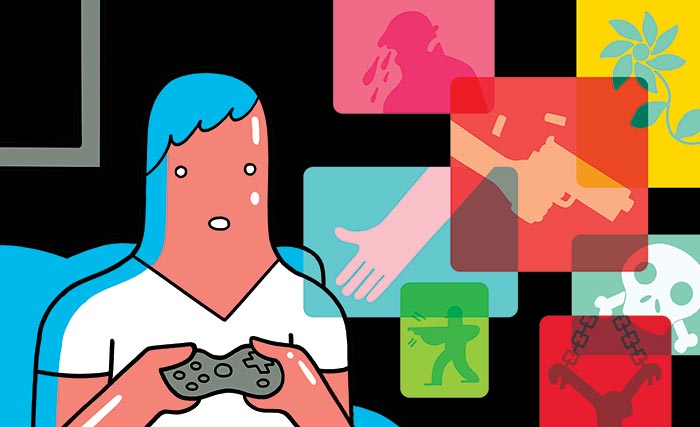I am not myself today. Today I am Sam Fisher, the commander of Fourth Echelon, an American black ops counterterrorism unit. I’m handsome, in a shark-jawed, Channing Tatum kind of way, with bulbous biceps and a chest as hard as granite. I am an expert in advanced fieldcraft and hold a third-degree black belt in Krav Maga. In action movie parlance, I’m a rogue. A renegade. A loose cannon.
In my latest mission, I have snuck in to Guantánamo Bay, where I plan to interrogate an Iranian prisoner named Reza Nouri. I thunder into a rusty cell and throw him to the ground. “Please stop, I beg you,” he whimpers as I slam a chair into his bound wrists. “No one’s coming to help you, Nouri,” I hear myself growl. “You want to keep your hands? I want names.” He relents and tells me what I need to know. Then he pleads. “Please, just kill me. I deserve that much mercy.” At this point, a choice presents itself to me in the form of a text box: do I spare him or snap his neck?
This is the world of Tom Clancy’s Splinter Cell: Blacklist for Xbox 360, PlayStation 3, Wii U, and Microsoft Windows, released last August by Ubisoft Entertainment, one of the gaming industry’s largest publishers. Although the company is headquartered in France, it generates its biggest business from two Canadian studios: Ubisoft Montréal, a 2,400-employee operation in Mile End; and Ubisoft Toronto, which opened four years ago in a $263-million expansion deal with the Ontario government. In its last fiscal year, Ubisoft racked up $1.8 billion in sales, largely from such blockbuster franchises as Assassin’s Creed, Far Cry, and Just Dance.
If you are familiar with these games, you know that we are at the apex of the golden age of gaming. Gone is the cartoonish world of early Nintendo, a proto-realistic Pleistocene in which advanced gaming consisted of two Italian plumbers shooting fireballs at malevolent turtles. Now, at performance capture studios like Ubisoft’s, actors in rigged-up leotards leap like parkour champions. Then a tech team transforms the digital data into characters who breathe, slither, and sneak with an eerily human verisimilitude. A group of graphic design wizards studies topography, architecture, and even census records to construct a familiar world amped up with dystopian details, while writers develop characters, plots, and objectives that respond to players’ choices. The result of this creative synergy is, well, a virtual reality.
Now the medium is honing in on a new frontier: moral reality. While storytelling elements such as character and plot have become increasingly sophisticated since The Legend of Zelda debuted in the ’80s, most games still reflect a rudimentary understanding of human motivation, falling back on a Neanderthal survivalist instinct: kill good, die bad. Ubisoft is attempting to correct this—initially by infusing its games with moral subjectivity (good guys can be bad and bad guys good)—and subsequently in games like Blacklist, by expanding players’ moral agency. Of course, with the power to determine how you want to win, inevitably, comes great responsibility. In the company’s next big release, and for the first time in gaming history, players will be accountable for their actions.
Ubisoft made its first foray into the moral realm with Assassin’s Creed, a behemoth franchise launched in 2007 that catalogues the rivalry between two ancient secret societies: the Knights Templar, based on the real-life Middle Ages military order, and the Assassins, the fictional renegades who undermine them. Each instalment follows an Assassin through a different time and place, such as the Crusades, the Renaissance, or the pirate-plagued Caribbean. In Assassin’s Creed III, released in 2012, players slip into the skin of Connor Kenway, a.k.a. Ratonhnhaké:ton, a half-English, half-Mohawk Assassin who stumbles into landmark historical moments of the American Revolution such as the Boston Tea Party, the Battle of Monmouth, and the attack on Fort George, all in a quest to save his village from falling under Templar control.
But Connor is no common action hero. He and his fellow Assassins embody libertarianism, an extreme form of democracy that values free will above all other rights. The titular creed—“Nothing is true, everything is permitted”—comes from Friedrich Nietzsche’s Thus Spoke Zarathustra, and it taps into the Assassins’ unflagging, fanatical belief in individualism, and their willingness to descend into violent vigilantism for the sake of the cause. At the other end of the moral spectrum stand the villainous Templars, who adhere to Benthamite utilitarianism, prizing the greater good above individual freedom. In the interest of protecting humanity from its savage nature, a belief counteractively reinforced by the Assassins’ violent anarchy, they form a military elite that imposes near-fascist controls to bring about peace.
It’s a classic moral conflict, lifted straight from the real world. What’s more, the writers make every effort to endow both sides with humanity. To wit: early on, before adopting Connor’s avatar, players see the game through the eyes of Haytham Kenway, his father, one of the “evil” Templar overlords. However, like Connor, he happens to be just, merciful, and deeply ideological; at one point, he even helps his son save the tribes from colonial armies. The most morally complex moment comes when Connor, our supposed hero, kills his own father in pursuit of his anarchic ideals.
The upshot is that each group, real and invented, has moments of virtue and vice, valour and cowardice. But while Assassin’s Creed allows players to explore the American colonies, sling arrows from watchtowers, and prowl through forests, they can only admire the undulating moral landscape from a distance. They are simply not equipped to wade into the muck.
Patrick Redding, a forty-something geek with a manicured five o’clock shadow, is a creative director at Ubisoft Toronto, and the former game director on the Splinter Cell series, beginning with 2010’s Conviction. Protagonist Sam Fisher, in this instalment retired from black ops, seeks vengeance for the death of his daughter. Along the way, he discovers a private military contractor who is plotting an attack on the United States. As you pursue Fisher’s twin missions, you can slam a guy’s head into a mirror or cook his face on a sizzling stove—but even while players control the mechanics of torture, they have no real agency. As in such primitive games as Super Mario World, these actions are required to progress to the next level.
In Blacklist, Redding eliminated the interactive torture scenes and instead gave players a choice: kill mercenaries like Nouri or let them live. Notably, neither decision impacts the outcome, which Redding explains as a way to reinforce the moral ambiguity. “If I build a system of morality into the game where players earn a gold coin for moral decisions, I’ve screwed up,” he tells me over the phone from his studio. “I’ve reduced those decisions to a rewards system. They become strategy, not choice.”
It is this experience of choice that engages the player. A character you can kill for points or coins or ammunition becomes little more than some Pac-Man-like sprite, a faceless target standing between the player and victory. When that reward system is removed, the human face of the enemy rematerializes, and the experience goes beyond the mechanics of shooting, running, and dodging; for the first time, the player lives in that reality. Still, the choice exists in a vacuum: without any game world consequences, the only victim is the player’s conscience.
Mine is truly troubled as Nouri writhes on the ground of the Guantánamo cell, pinned under Fisher’s mammoth thigh. I hear him gasp for breath, see his Adam’s apple bobbing. I bite my fingernails, stare deep into his pixelated eyes, and remember his plea: “Just kill me.” If I save Nouri, do I doom him? Is murder ever a merciful act? In that instant, the game yanks me out of muscle memory mode and implicates me in a ruthless thought experiment.
As high as those stakes are, Ubisoft Montréal creative director Jonathan Morin and his imagineers have upped the ante once again with Watch Dogs, due out this year. Its anti-hero is Aiden Pearce, a grizzled Irish hacker in a leather duster who lives in an alternate-reality Chicago, a perpetually rainy, Orwellian nightmare operated—and monitored—by an intricate supercomputer network. Known as ctOS, it controls every aspect of municipal life, from the electric grid and surveillance systems to political influence and economic trade. Pearce, like his Assassin forebears, is a vigilante and former criminal. Unlike them, he is neither virtuous nor vicious, but a moral tabula rasa; that is, the player calibrates his position on the good-evil spectrum.
“One thing that was really important to us when we designed Watch Dogs,” says animation director Colin Graham, in an early demo, “was to support different players’ styles. Every situation in the game can be tackled in a way that the player sees fit.” Having discovered a ctOS server room, for example, the player can go in guns blazing, opt for a stealth infiltration, or hack from a distance, and each option has immediate as well as long-term consequences, via a reputation score.
The game world contains TV newscasts, papers, and social media that report on players’ actions. As Aiden, you can hack into smart phones and computers and see what bystanders have been saying about you. The more visible and violent your vigilantism, the more points added to or subtracted from your reputation score, which determines whether you are seen as a hero or a villain in the eyes of the fictional media machine. As in the real world, morality is a matter of opinion.
In line with Redding’s reasoning on Blacklist, the reputation score is not a rewards system. It can affect the game’s trajectory—if bystanders see Aiden as a hero, they may choose to help him get away from the cops, or turn him in if they perceive him as a threat—but the reputation has no direct correlation with strategy. Rather, like myriad other contextual elements (such as weather and traffic), it contributes to the ever-more complex compound of choices and actions available.
The appeal of gaming has always been the thrill of challenge and the cathartic pleasure of self-improvement. For obsessive types who have attained the apotheosis of mechanical skill, moral agency adds a welcome dimension to a kind of gameplay that might otherwise grow stale. It pulls players further into the fabric of the game, upping their investment and intensifying their immersion, which becomes plainly obvious to me as I stew over what to do about Nouri. In the end, I hit “spare.” Sam Fisher strikes the bloodied prisoner in disgust and lumbers out of the cell. Within seconds, he is focused on his next mission, escaping from Guantánamo and battling terrorists in Mexico—but I can’t shake the experience quite so easily. For a moment, the game felt all too real.
This appeared in the March 2014 issue.




